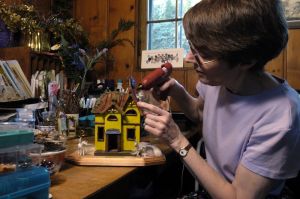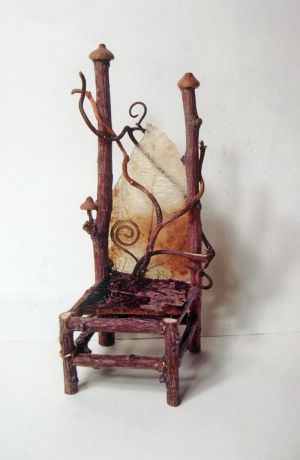By Colleen LaMay
Boisean Marilyn Cosho, 56, lives happily alone with her three cats in a rental house on her mother’s property. She likes her day job teaching English to immigrant and refugee children in the Boise School District, but she has passionate hobbies and interests, too, and her latest is creating miniature fairy houses and fairy twig chairs.

One of Marilyn Cosho's hobbies is making miniatures.Above, she works on a tiny house at her home in Boise. Photo by Brad Talbutt / Idaho Statesman
The pieces have a definite "wow" factor. Decorated with tiny animals and furniture, they are fun and often extremely detailed. My 11-year-old daughter, Kuranda, was entranced, but then, so was I, and I’m 47. They appeal to the kid in all of us. Cosho has created more than 300 of the intricate chairs. Each is about 5 inches tall and is made of small sticks, leaves, moss, tiny ornaments and other decorations. Some take up to nine hours to complete. She sells them at Crone’s Cupboard and Edwards Greenhouses in Boise.

Her fairy twig chairs are extremely delicate, intricate — and beautiful. Photo by Brad Talbutt / Idaho Statesman
This is Cosho’s 16th year in the Boise School District. She began as a special education assistant and now teaches immigrants and refugee students as a tutor in the English Language Learners, or ELL, program. She is a certified teacher of kindergarten through eighth grade, with endorsements in reading, history, German, music and art. She recently passed the state Intensive Behavior Intervention exam. She is the author of two children’s books, "The Suzuki Idea Book for Beginning Violin" and "Owls and Pussycats, Are They Alike?"
She played violin and later viola for 10 seasons with the Boise Philharmonic. She is, in her own words, an "extreme" fan of Glenn Gould, a Canadian pianist considered brilliant and eccentric. Cosho owns every recording of his that she can find, and she listens to Gould every day. "Music can transport me," she said. She writes poetry and has created more than 50 collages. In hindsight, each collage represents one aspect of her inner search of what would ultimately be diagnosed as Asperger’s syndrome.
Through her more than five decades of life, Cosho never really fit in with other people, no matter how hard she tried. She was anxious and depressed. Help would find her, but she couldn’t see it coming. It would take 54 years, but a psychologist in the Treasure Valley eventually put a label on her life that she says fit: Asperger’s syndrome, a developmental disorder and a mild form of autism. This is Marilyn’s story.
By Marilyn Cosho as told to Colleen LaMay
I searched for years for the help that would free me to be my somewhat eccentric self. In the meantime, I managed to keep my head above water. My IQ is above average and yet everyday activities like figuring out school assignments, teachers’ expectations and making friends have been daunting since I was a child.
I wanted and needed to be perfect, but my only A’s in school were in orchestra, English and typing. I received mostly B’s, a handful of C’s and a sprinkling of D’s. My parents knew I was trying my best and never criticized me. But I was very critical of myself. Despite my parents’ support, I didn’t think I was good enough. By about age 12, I was sure my dreams of marriage, children and a self-supporting career were doomed to failure, but I never told anyone. As long as I was in school, I could hide and delay what I instinctively knew would be my fate — living alone.
Other teenagers — their words, behaviors and interests — made no sense to me. Each year, I felt more out of place. Entering junior high school, I felt more and more bewildered and alienated. I was not interested in the latest fashions or music. English composer Orlando Gibbons was sublime; the Rolling Stones, intolerable.
I felt like a 12-year-old kid on the inside long after my 50th birthday — a child always trying to figure out why the grownups acted the way they did. I grew out of the body of a child and joined the adults, but I wasn’t one of them. In college, I became increasingly obsessed with studying and earned straight A’s my final semester. My overall grade-point average was 3.5. Graduating was one of my proudest achievements.
I was successful, but there was too much I didn’t understand about the world and the people who glided through it effortlessly. I went to mental-health professionals for help, but I didn’t understand them, and they didn’t understand me. For a decade, I played violin and then viola in the Boise Philharmonic. At age 25, I married a musician I trusted would protect me. After 15 years, the marriage ended in divorce. I was devastated. I could not bear to listen to music for the next eight years. I doubt I will marry again. For four years after the divorce, I lived in a basement apartment in the house of my sister’s family. Then I moved into a small rental house at the back of my mother’s property.
Many people find moving stressful and exhausting. But this move disassembled my life. The timing was bad, through no fault of my family. I was working and going to school, and finding time to move my things became a huge obstacle. As I usually do when I feel overwhelmed, I methodically focused on the little things, very little things. I carefully organized all of my possessions, no matter how small. I folded sacks and stored them in the same direction. I sorted books by topic. I hunted down all the minutia of my life, categorized it and put it in its proper place, even if it took most of the night. Eventually, through a series of lucky coincidences, I made my way to Boise social worker Sara Hill. On a hunch, she sent me to Meridian psychologist Tyler Whitney, who diagnoses and treats disorders related to autism.
I cried tears of joy when Dr. Whitney diagnosed me. I remember the date: April 13, 2006. I was 54 years old and had worked harder than you can imagine finding a place for "me" in the often-mysterious world of human relationships. Now that I knew why I had to try so hard, I stopped trying so hard. All of the pieces of the puzzle finally fit together. I understood my past. Asperger’s syndrome can give people extra focus that sometimes leads to extraordinary accomplishments, but it also brings a measure of trouble to many. Whether Asperger’s syndrome holds people back or helps them is a subject of intense, sometimes emotionally charged debate on the Internet.
For me, there wasn’t much of a debate. For years, I lived with the constant guilt of failing to measure up. Now I have the luxury of accepting the good and the bad of the syndrome, as I guess we all have to accept the good and bad in ourselves, whether we are "Aspies" or "neurotypicals," as the online message boards label us all. I live alone now, but I am rarely lonely and never bored. I started letting myself be me.
I spent time at my solitary hobbies, investing hours making tiny furniture fit for tiny fairies and listening to music, particularly Gould. He died in 1982 and is thought to have had Asperger’s syndrome, although he never was diagnosed with it. I learned of him while researching Asperger’s after my diagnosis. His recordings restored my deep love of music. I think I hear and feel music the way he once did.
Since childhood, music has provided an entrancing escape. I remember listening to an old, scratchy recording of Enrico Caruso singing "Pagliacci," about a clown obliged to make people laugh in spite of a broken heart. Although I did not understand the words, sung in Italian, the music was beautiful, and tears streamed down my face. I was only 4 or 5 years old, an age when most kids love simple, rhyming songs that involve hand clapping and feet stomping. I listen to music when I have trouble in other areas of my life, like talking to people. I usually take what people say literally, which causes misunderstandings. At the end of the school summer break last year, an acquaintance asked, "How has your break been?" I had broken my wrist six months earlier and replied, "It was doing much better, thanks."
Although I might have trouble making sense of people, I feel extremely close to animals. Author Temple Grandin, who labels herself as autistic, wrote a book called "Animals in Translation," about her theory of why people on the autistic spectrum seem to have a special connection with animals. She theorizes that because neurons in the brain do not connect right, other parts of the brain become more specialized at perceiving details.
I am extremely sensitive to light, noise, touch/textures, smells and temperatures. I keep the shades closed at my house on sunny days. I don’t go outdoors much because the weather is too hot or too cold. I wear special earphones to cut down on outdoor noises. I wear special glasses that decrease glare from light. To me, it feels like life throws too much at my senses at one time. That’s one reason why people are so confusing. I miss the multitude of body and verbal cues that are competing with a constantly changing environment. Like other aspects of Asperger’s syndrome, this can be an advantage. For example, concentrating on one thing for several hours and creating structure and routines help keep me from feeling overwhelmed. To other people, different brain connections just look like odd behavior. That’s OK. Since my diagnosis, I am less of a mystery to myself. |